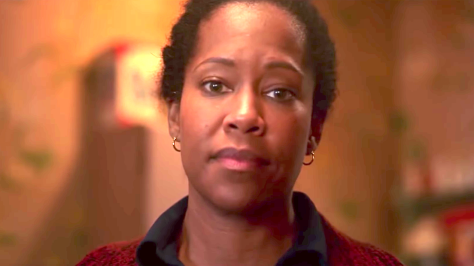Regina King’s performance in If Beale Street Could Talk epitomizes what a true supporting performance is. One that is based on quality more than the amount of screentime the performer has. That’s one reason she deserves to win the Best Supporting Actress Oscar.
One particular, and understandable, point of criticism that has taken place this awards season is the subject of category fraud in the supporting acting categories. Either lead performances that were waiting on the wings (i.e. Thomasin McKenzie in Leave No Trace, Emily Blunt in A Quiet Place) or lead performances that made the cut (The ladies from The Favourite) have taken up oxygen from genuine supporting performances. But thankfully, Regina King managed to be a force to be reckoned with in the Supporting Actress race and frankly, she deserves to win in the end.
But when you put aside the nature of campaigning politics, her performance alone still merits a win. As Sharon Rivers, the mother of Tish (KiKi Layne) who’s determined to help free her daughter’s lover Fonny (Stephan James) from prison, King plays a figure of warmth and steely determination. Even with just a look or a line reading, King can give us an idea of what kind of woman Sharon is.

For instance, during Sharon’s introduction scene, Tish is mustering up the courage to tell her about her pregnancy. We never see Tish say that she’s pregnant. Just the lead up to it and for the duration of that scene, Sharon is sensing that Tish wants to get something off her chest. When Tish finally speaks up and says, “Mama,” Sharon responds with “Yeah, baby?”
The words “Yeah, baby?” are just two words. Yet when Sharon says them, they’re spoken with such power. As a result of that impactful line delivery, “Yeah, baby?” ends up being one of the best line readings of any film this year. Again, they’re just two words. But they encapsulate how King radiates warmth every time she appears on screen. Also, the sympathetic expressions on King’s face demonstrate a slight lead up to the impact of her line reading.
Much like that particular moment, the performance isn’t exactly showy. But showiness shouldn’t have to be a deciding factor when picking a winner even if recent Supporting Actress winners have made it seem that way. Wins like Allison Janney in I, Tonya and Melissa Leo in The Fighter make it seem like the best kind of acting equals most acting. But without deterring from the quality of the aforementioned performances, most shouldn’t automatically mean best. In fact, crafting a character through delicate subtlety proves to be a more daunting task than acting with grand theatrics. Theatrics aren’t a bad method of performing. In fact, they can be put to good use when necessary. However, there are still other acting methods to gravitate towards.
Furthermore, Regina King acts as the powerful center of an already tremendous acting ensemble. Her mix of presenting warmth and strength in the face of hate serves as an encapsulation of the film’s themes. The film is about finding love and harmony when facing oppression and King brilliantly presents that optimistic yet determined feeling of seeking harmony even in her silence.
Regina King easily delivers one of the best supporting performances of the year and deserves the prize based on the quality of her work along with the reminder that Oscars for the supporting categories should be based on quality before quantity. Plus, Regina King has been in the business for decades and delivered a slew of quality performances, making everything she’s in better.
If Beale Street really could talk, it would say to give Regina King the Oscar. Hopefully, AMPAS voters are out there taking note of this plea.
